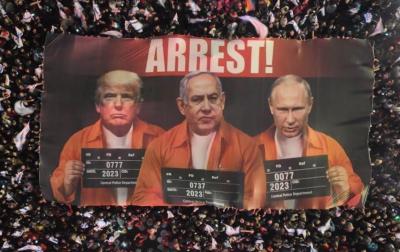
Israel protests score a win —for now

Israeli Prime Minister Benjamin Netanyahu on March 27 announced that he will delay his proposed reforms of the judicial system in the face of ongoing mass protests. Calling it a move to "avoid civil war," Netanyahu declared in a nationally televised address that his administration is "taking a timeout for dialogue." However, he added: "We insist on the need to bring about the necessary corrections in the legal system."
Protests against the reforms, which have continued since Netanyahu formed his new far-right government in late December, rose to a fever pitch after Netanyahu fired Defense Minister Yoav Gallant on March 25. Gallant had called for the judicial reforms to be suspended, warning that the societal rifts caused by the reforms were compromising the efficacy of the Israel Defense Forces, with reservists refusing to report for duty.
Since Netanyahu's announcement, protests have abated, and labor unions have called off a planned general strike. But opponents of the reform remain wary that the current respite is only a temporary one, a tactic to buy time while tensions cool. "How many more times can we fall into the trap of cooperating with Netanyahu?" asked Merav Michaeli, head of the center-left Labor Party. "The struggle and protest must continue and intensify."
National Security Minister Itamar Ben Gvir, the most hardline figure in the new administration, announced that he agreed to the delay of the reform package in exchange for Netanyahu's support of a proposed "National Guard" under Ben Gvir's command. The Association for Civil Rights in Israel responded by warning that the National Guard would be "an armed private militia that will be directly subordinate to Ben Gvir." In 2007, Ben Gvir, who now leads the far-right Jewish Power (Otzma Yehudit) party, was convicted of incitement to racism and support for a terrorist organization. (Jurist)
The Knesset on March 23 passed the first of several bills in the judicial reform package. The new measure amends Israel's Basic Law, raising the threshold at which the government can declare the prime minister incapacitated. This has obvious relevance to Netanyahu, who continues to face numerous corruption charges in Israel's courts. (Jurist)
Ben Gvir's Otzma Yehudit party is also pushing a measure that would reinstate the death penalty in Israel for "terrorism" offenses. This bill was harshly criticized in a Feb. 24 statement from a panel of UN human rights experts, who asserted: "The reinstatement of the death penalty is a deeply retrogressive step. More so when, on the face of it, the punishment will apply against minorities living within the State or those who live under the 55-year military occupation and rule." (Jurist)
The demonstrations have not focused on the growing violence in the West Bank, or the new government's openly annexationist agenda for the territory. After a Feb. 21 statement of "concern and dismay" from the UN Security Council over settlement expansion, Netanyahu initially responded harshly, saying the "one-sided statement...denies the rights of Jews to live in our historic homeland." But his administration subsequently appeared to compromise on the question. After a summit with Palestinian, Egyptian and Jordanian leaders in Aqaba Feb. 26, Israel agreed to a joint statement pledging to freeze settlement expansion and "work towards a just and lasting peace." However, this was immediately repudiated by Finance Minister Bezalel Smotrich, who proclaimed: "There will not be a freeze on construction and development in the settlements, not even for one day." Ben Gvir echoed this sentiment, stating: "What was in Jordan (if it was), will stay in Jordan." (Jurist, Jurist)
Smotrich is still facing controversy for his March 1 call for Huwara, the scene of recent violence between settlers and Palestiians, to be "wiped out" by the Israeli military. He has since been shamed into an apology for the comment, which sparked a public protest from Israeli Air Force pilots. (Times of Israel)
On March 21, seemingly in defiance of the Aqaba statement, the Knesset voted to allow Israeli citizens back into the sites of four West Bank settlements that were evacuated at the time of the disengagement from the Gaza Strip in 2005. The four isolated settlements in the northern West Bank—Sa-Nur, Ganim, Kadim and Homesh—were ordered evacuated under the same legislation that mandated the Gaza withdrawal. The US State Department said the White House is "extremely troubled" by the new law allowing settlers to return to the outposts. (BBC News, The Hill)
Despite the general single-issue focus of the protests on the judicial reform, the demonstrations have included an "anti-apartheid bloc" calling for a secular state and decolonization of Palestinian lands. A banner from the mass mobilization on Tel Aviv this past weekend featured an image of Netanyahu, Putin and Trump in orange prison jumpsuits with the words: "ARREST! NO ONE IS ABOVE THE LAW." (Jerusalem Post)

